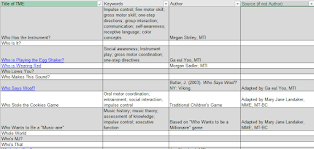TME Tuesday: The Database
The most important tool that I have ever developed for myself is my therapeutic music experience (TME) database. Oh, the benefits of this database!! Let me try to persuade you to set up your own database/system of keeping track of your ideas in the next few paragraphs as part of my TME Tuesday posts...are you ready? Here we go!
When I was first offered the opportunity to write TMEs (now, it wasn't as much of an opportunity as it was a class assignment), computers were not really all that prevalent in our everyday world. Yep, I am that old. We didn't have cell phones that doubled as our storage link to the cloud and all that. I started writing my TMEs on index cards, and I continued doing that until I purchased my first personal computer of my very own. At that point in my life, I had two boxes full of index cards and lots of new ideas to put into the computer, so I started to figure out what I needed to do and then how to get those things done.
I now have a database of TME ideas from me, from many of my interns (but only the ones who have used computers), from other sources as I have come across the ideas. There are many different ideas on the list, and it is organized by title, author, source, and goal areas. I use this tool to remind me of TMEs to increase novelty, to offer familiar TMEs that have fallen out of favor for some reason or another, or to supplement the main musicking that happens in the music therapy room.
Okay, enough nattering. Here is the secret to my ideas - this database offers me so much information for a little bit of time investment. I am always looking for ways to update and simplify my system, but I haven't found anything yet that works easier than what I already have.

After the purpose is outlined, I move to author. I try my best to source all music and ideas back to their original composers or developers, but I can't always do that. All original compositions bear the name of the person who composed the song (if known). The next column is where I put the name of the TME developer or secondary source of the TME idea. Many of my TMEs are not original songs, so I am listed as the secondary source. While I did not write the music, I did develop the TME idea, so I get a bit of credit for that work. If it is not my idea, then I put the name of the person who gave me that idea.
That's it. That is my entire database. TMEs are linked to the complete files or the index cards that contain the full idea.
I still use my index cards to this day, but they are more for rough drafts of my compositions rather than full-blown ideas.
Once my ideas are set down, I move to my TME file template and complete the different areas to think out the entire process. I then add the information to the database as appropriate, and I am all set for using the TME with my clients or in my sing about mini editions.
I use this database as I started to describe above. There are times when I fall into TME ruts - using the same old ideas over and over until I am bored but cannot think of options while I am in the rut. This database helps me pop out of that rut and into other ways of approaching the same goals with different ideas and experiences. I simply use the search function in my database and all the TMEs that address a particular goal pop up. All of a sudden I have 15 new ideas to use, courtesy of my brain and my interns. The database also allows me to give credit where credit is due - the intellectual property of my interns is theirs and I strive to always give them the credit for their work! I hope they will offer me the same courtesy.
Like I have said, my TME format is something that helps me determine all sorts of uses, themes, ideas, and experiences for my clients. The database is a different system that allows me to remember all of my ideas and the ideas of others. When I want a Halloween-themed TME, I look at the H portion of my database for links to all the Halloween TMEs that I have as part of my database. The session strategy almost writes itself! I find that having a robust TME file helps me with session strategizing because I have spent so much time putting together the central idea that it is memorized and ready for presentation immediately (for me, I am not sure if my interns feel the same way - they seem to benefit from the process of writing things in this manner, but I am completely biased when it comes to what works for me...).
I am very behind in my database update process. It is one of those chores that is constantly present but isn't all that fun so it just keeps getting moved up and down the to-do list. I have about five interns to put into the database - just have to do it, but it keeps getting put off. Summer school goal, maybe??
Happy TME Tuesday.





Comments
Post a Comment